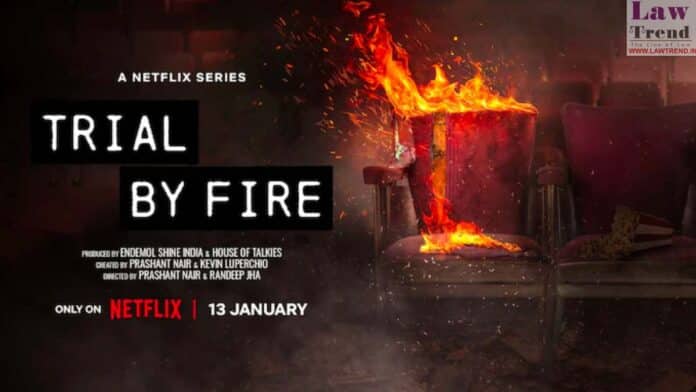Real estate tycoon Sushil Ansal, convicted in the 1997 Uphaar cinema fire case, on Tuesday submitted before the Delhi High Court that he wishes to withdraw a suit seeking to restrain the release of web series “Trial by Fire”.
The series, inspired by the tragedy, streamed on Netflix on January 13 as the high court refused to stay its release and had dismissed an application for the interim stay.
A massive fire had broken out at the Uphaar cinema during the screening of the Hindi film “Border” on June 13, 1997, claiming 59 lives.
On Tuesday, the suit was listed for completion of pleadings before Joint Registrar (Judicial) Vandana Jain.
The counsel for plaintiff Sushil Ansal submitted before the joint registrar that “she wishes to withdraw the present suit and requests for placing the matter before court”.
At the request of the counsel, the joint registrar fixed the matter for April 17 for further directions before the bench which had passed the interim order.
While dismissing the interim application to stay the release of the web series, Justice Yashwant Varma on January 12, has observed that the unimaginable tragedy made the “nation bow its head in shame”.
Ansal, who alleged defamation, had urged the court to grant an injunction against the release of the web series, saying even its teaser got 1.5 million views in four days which shows the immediate impact it has.
As the 83-year-old Ansal, one of the owners of the cinema hall, also sought to restrain the circulation and publication of a book titled “Trial by Fire- The tragic tale of the Uphaar Tragedy”, the court had said that for the reasons best known to him, the plaintiff chose not to initiate any injunctive action in respect of the literally work when it came to be originally published on September 19, 2016.
The book was authored by — Neelam and Shekhar Krishnamoorthy — who lost their two children in the blaze.
“A slothful or sluggish plaintiff seeking an injunction of the nature which is sought in these proceedings cannot be allowed to claim such reliefs,” the high court had said.
It had said the work on which the web series is based has been penned by parents who had lost their teenaged children in the unfortunate incident and it is a story which alleges a systemic failure, manifests a cry of anguish against the manner in which the incident was prosecuted and tried.
It had also taken into consideration the disclaimer which is proposed to preface the web series which merely claims to be “inspired” by the book.
Ansal had claimed the web series directly attacks his personality.
Ansal’s plea was vehemently opposed by the counsel for the producers of the web series, Netflix and authors of the book — the parents.
In his plea, Ansal had said he has been “punished both legally and socially” and the release of the series, based on the book written by a couple who lost their two children to the fire, will cause irreparable harm to his reputation and breach his right to privacy.
“The events are causing and will cause loss of reputation of the plaintiff, public trial, humiliation, stigmatisation and irreparable injury along with causing grave prejudice to the revision petitions pending before this court arising out of the (evidence) tampering case,” the suit had said.
In 2017, the Supreme Court had finally decided the Uphaar cinema blaze case and directed the now 83-year-old Sushil Ansal and his brother Gopal Ansal (74) to pay a fine of Rs 30 crore each.
The top court had then released Sushil Ansal taking into account the period he had already spent in jail.
The Ansal brothers and two others were later held guilty of tampering with the evidence related to the trial.




